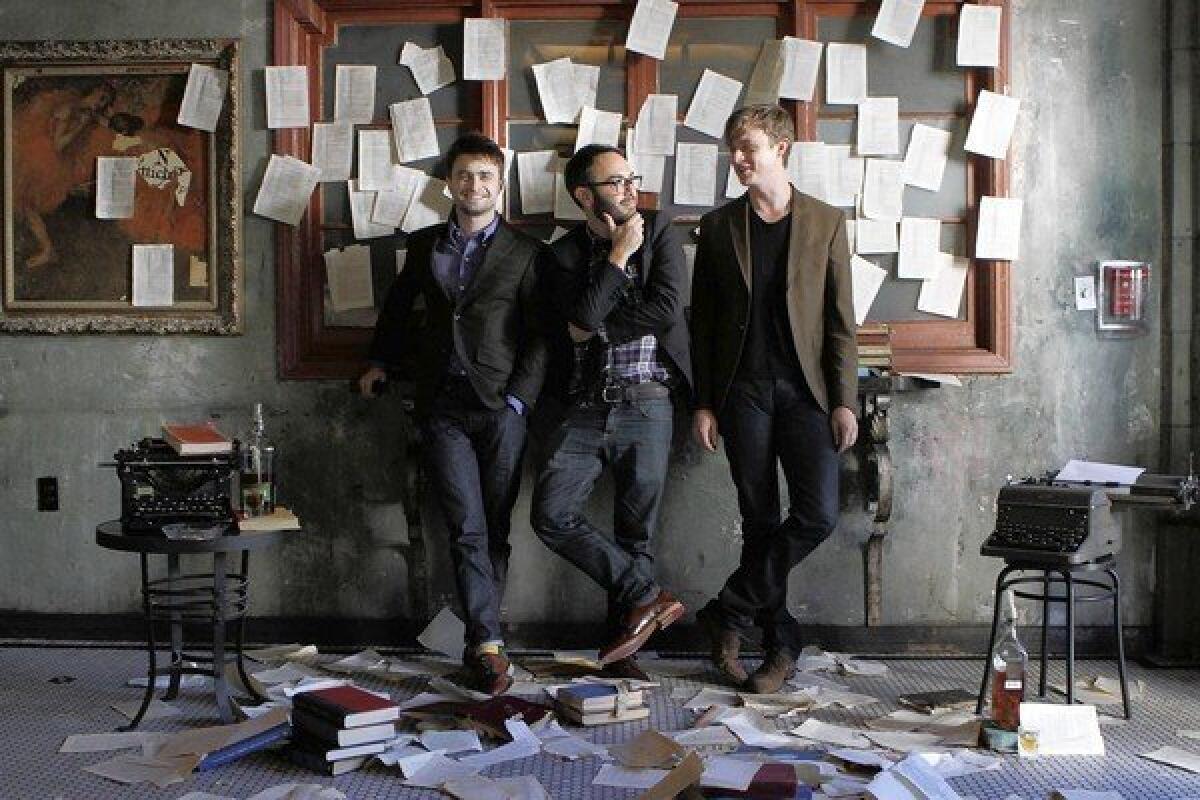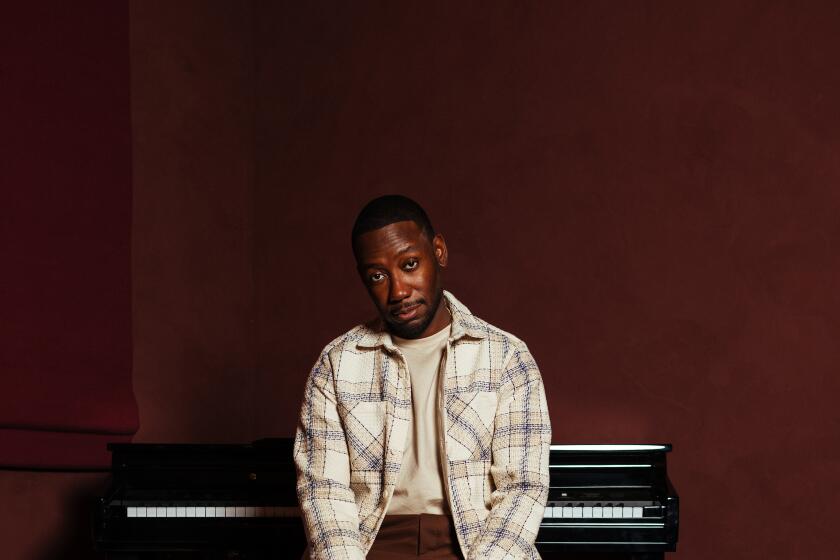‘Kill Your Darlings’ is ‘a love letter to the Beats’

The superhero origin story has become popular in the last few years, so it makes sense the form might also spread to stories outside the comic-book genre — like Beat generation writers. The new film “Kill Your Darlings” tells the tale of how before they were Ginsberg, Kerouac and Burroughs, they were just Allen, Jack and William, young men settling into the paths that would lead them to the literary landmarks of “Howl,” “On the Road” and “Naked Lunch,” respectively.
The drama — starring Daniel Radcliffe, Dane DeHaan and Michael C. Hall — focuses on 1943 and 1944, when the three were brought together by Lucien Carr, who surrounded himself with artists, creativity and culture and has been described as both “muse” and “midwife” to the Beats. Carr’s role in the legacy of the Beats has largely been lost in the blur of his killing of another man; “Kill Your Darlings” looks to replace that missing puzzle piece.
The film, which opens Wednesday, is the feature debut from director John Krokidas, who co-wrote the screenplay with his former college roommate Austin Bunn. The movie took some 10 years to pull together from the time Bunn first told Krokidas about Carr’s story. The film explores a complicated roundelay in the intertwined relationships between Carr and the man he killed, David Kammerer; Carr and Ginsberg, Kerouac and Burroughs; and all of them to the literary establishment and cultural attitudes of their day.
PHOTOS: Celebrities by The Times
Yet even with the details that emerged from their research into Carr’s enigmatic relationship with Kammerer, a bond that pointed toward codependency and dysfunction, there was always another relationship that for Krokidas and Bunn formed the center of their story.
“The more important relationship in the movie to me really is the one between Allen and Lucien,” said Krokidas in an interview alongside Radcliffe and DeHaan in Los Angeles.
“The film is intentionally a love letter to the Beats because they meant so much to us,” explained Krokidas, 40, who splits his time between New York and Los Angeles. “But I also aspire for it to be for anyone who has had that feeling of wanting to do something unique or important with their lives, wanting to say something somehow to the world. And with these guys that might never have happened if it weren’t for Lucien Carr.”
Radcliffe, Jack Huston and Ben Foster play Ginsberg, Kerouac and Burroughs, respectively, with DeHaan as Carr and Hall as Kammerer. Elizabeth Olsen plays Kerouac’s girlfriend, Jennifer Jason Leigh plays Ginsberg’s mother, while in a witty touch, Ginsberg’s father is portrayed by David Cross, who himself played Allen Ginsberg in Todd Haynes’ “I’m Not There.”
With indie veteran Christine Vachon as a producer, “Kill Your Darlings” is rather ambitious for a relatively low-budget movie, a period picture shot in some 24 days and made for around $4 million.
PHOTOS: Fall movie sneaks 2013
The film, however, does have some contemporary flourishes: In trying to capture the energy and spirit of the Beats’ work, Krokidas set aside historical accuracy at moments to use contemporary music by groups such as TV on the Radio and the Libertines to pull the Beats out of history and forward into the modern day.
“It’s as much how they did what they did as what they did,” said Radcliffe of the ongoing influence of the Beats. “That kind of wild abandon is very exciting and infectious and that’s one of the reasons they are still so popular today. They have come to be a sort of avatar for any generation’s idea of rebellion.”
The film actually marks the first time Radcliffe, a veteran at age 24, has shot a film in America. (He even got his Screen Actors Guild card.) As he puts the title role of the “Harry Potter” franchise further behind him, Radcliffe was recently at the Toronto International Film Festival not only with “Kill Your Darlings” but also the romantic comedy “The F Word” and the fantasy drama “Horns.”
Krokidas first spoke with Radcliffe about the role when the actor was appearing in a 2008 production of “Equus” on Broadway. When Radcliffe’s appearances in the final two “Harry Potter” films made the actor unavailable as “Kill Your Darlings” was coming together, the director looked to recast the part with Jesse Eisenberg. Then when Eisenberg dropped out — “Thank you, Jesse,” joked Radcliffe — the timing was right for Radcliffe to step back into the role.
When “Darlings” had its world premiere in January at the Sundance Film Festival, Radcliffe’s explicit gay sex scene got audiences talking. Playing as part of a montage in which the characters all move toward their next phase, the moment is placed against Carr’s killing of Kammerer, Kerouac grieving for a friend who died in World War II and Burroughs’ nascent intravenous drug use. As the film has moved closer to release, Radcliffe has found the scene a frequent topic in interviews, mostly, he believes, because of its contrast with his boy wizard role.
PHOTOS: Hollywood backlot moments
“No one else gets asked this,” Radcliffe said. “That’s the reality. You might get asked about what it’s like to play gay or what was it like to do a gay sex scene, but not the level of questions of it being a shocking thing or did I think it was a risk.
“No, it’s not a risk to do a gay sex scene,” Radcliffe added. “It’s a risk to do a bad one in a [terrible] movie, but this is a really good movie, so it’s not a risk. It is definitely something I feel wouldn’t be nearly as talked about if it was not somebody who spent a large part of their life doing a kids’ franchise.”
If it was Carr who first brought the Beats-to-be together, the aftermath of Kammerer’s killing had a fracturing effect on their circle. Carr served two years in jail, claiming self-defense against Kammerer’s homosexual advances, and after his release went on to a long and respected career as a news editor.
Kerouac and Burroughs, who were arrested as material witnesses to Carr’s crime, wrote a fictionalized account of the Carr/Kammerer story in “And the Hippos Were Boiled in Their Tanks,” which was not published until 2008, three years after Carr’s death. Kerouac would also write a veiled version of the story in his 1968 novel “Vanity of Duluoz.” Ginsberg dedicated the first edition of “Howl” to Carr, who then asked for his name to be removed from further editions as he turned away from his pre-Beat past.
“I think the relationship is hard to define between Lucien and David because it’s a really complicated relationship,” said DeHaan. “Especially in that Lucien, after the story, worked so hard for this story not to be told. I had to definitely remove myself from the Lucien that Lucien would have wanted to see.”
More to Read
Only good movies
Get the Indie Focus newsletter, Mark Olsen's weekly guide to the world of cinema.
You may occasionally receive promotional content from the Los Angeles Times.









